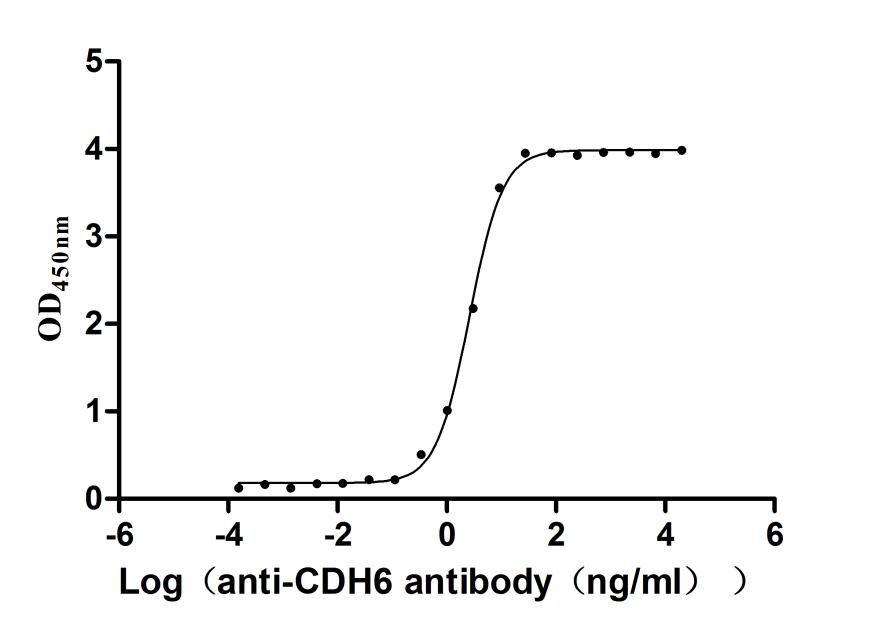Recombinant Human immunodeficiency virus type 1 group M subtype B Protein Rev (rev)
-
中文名稱:Recombinant Human immunodeficiency virus type 1 group M subtype B Protein Rev(rev),Yeast
-
貨號:CSB-YP361651HKW
-
規(guī)格:
-
來源:Yeast
-
其他:
-
中文名稱:Recombinant Human immunodeficiency virus type 1 group M subtype B Protein Rev(rev),Yeast
-
貨號:CSB-EP361651HKW
-
規(guī)格:
-
來源:E.coli
-
其他:
-
中文名稱:Recombinant Human immunodeficiency virus type 1 group M subtype B Protein Rev(rev),Yeast
-
貨號:CSB-EP361651HKW-B
-
規(guī)格:
-
來源:E.coli
-
共軛:Avi-tag Biotinylated
E. coli biotin ligase (BirA) is highly specific in covalently attaching biotin to the 15 amino acid AviTag peptide. This recombinant protein was biotinylated in vivo by AviTag-BirA technology, which method is BriA catalyzes amide linkage between the biotin and the specific lysine of the AviTag.
-
其他:
-
中文名稱:Recombinant Human immunodeficiency virus type 1 group M subtype B Protein Rev(rev),Yeast
-
貨號:CSB-BP361651HKW
-
規(guī)格:
-
來源:Baculovirus
-
其他:
-
中文名稱:Recombinant Human immunodeficiency virus type 1 group M subtype B Protein Rev(rev),Yeast
-
貨號:CSB-MP361651HKW
-
規(guī)格:
-
來源:Mammalian cell
-
其他:
產(chǎn)品詳情
-
純度:>85% (SDS-PAGE)
-
基因名:rev
-
Uniprot No.:
-
別名:rev; Protein Rev; ART/TRS; Anti-repression transactivator; Regulator of expression of viral proteins
-
種屬:Human immunodeficiency virus type 1 group M subtype B (isolate MN) (HIV-1)
-
蛋白長度:full length protein
-
表達(dá)區(qū)域:1-115
-
氨基酸序列MAGRSGDSDE ELLKTVRLIK FLYQSNPPPS SEGTRQARRN RRRRWRERQR HIRSISAWIL SNYLGRPAEP VPLQLPPQRL TLDCSEDCGT SGTQGVGSPQ ILVESPTVLE SGTKE
-
蛋白標(biāo)簽:Tag?type?will?be?determined?during?the?manufacturing?process.
The tag type will be determined during production process. If you have specified tag type, please tell us and we will develop the specified tag preferentially. -
產(chǎn)品提供形式:Lyophilized powder
Note: We will preferentially ship the format that we have in stock, however, if you have any special requirement for the format, please remark your requirement when placing the order, we will prepare according to your demand. -
復(fù)溶:We recommend that this vial be briefly centrifuged prior to opening to bring the contents to the bottom. Please reconstitute protein in deionized sterile water to a concentration of 0.1-1.0 mg/mL.We recommend to add 5-50% of glycerol (final concentration) and aliquot for long-term storage at -20℃/-80℃. Our default final concentration of glycerol is 50%. Customers could use it as reference.
-
儲存條件:Store at -20°C/-80°C upon receipt, aliquoting is necessary for mutiple use. Avoid repeated freeze-thaw cycles.
-
保質(zhì)期:The shelf life is related to many factors, storage state, buffer ingredients, storage temperature and the stability of the protein itself.
Generally, the shelf life of liquid form is 6 months at -20°C/-80°C. The shelf life of lyophilized form is 12 months at -20°C/-80°C. -
貨期:Delivery time may differ from different purchasing way or location, please kindly consult your local distributors for specific delivery time.Note: All of our proteins are default shipped with normal blue ice packs, if you request to ship with dry ice, please communicate with us in advance and extra fees will be charged.
-
注意事項:Repeated freezing and thawing is not recommended. Store working aliquots at 4°C for up to one week.
-
Datasheet :Please contact us to get it.
靶點(diǎn)詳情
-
功能:Escorts unspliced or incompletely spliced viral pre-mRNAs (late transcripts) out of the nucleus of infected cells. These pre-mRNAs carry a recognition sequence called Rev responsive element (RRE) located in the env gene, that is not present in fully spliced viral mRNAs (early transcripts). This function is essential since most viral proteins are translated from unspliced or partially spliced pre-mRNAs which cannot exit the nucleus by the pathway used by fully processed cellular mRNAs. Rev itself is translated from a fully spliced mRNA that readily exits the nucleus. Rev's nuclear localization signal (NLS) binds directly to KPNB1/Importin beta-1 without previous binding to KPNA1/Importin alpha-1. KPNB1 binds to the GDP bound form of RAN (Ran-GDP) and targets Rev to the nucleus. In the nucleus, the conversion from Ran-GDP to Ran-GTP dissociates Rev from KPNB1 and allows Rev's binding to the RRE in viral pre-mRNAs. Rev multimerization on the RRE via cooperative assembly exposes its nuclear export signal (NES) to the surface. Rev can then form a complex with XPO1/CRM1 and Ran-GTP, leading to nuclear export of the complex. Conversion from Ran-GTP to Ran-GDP mediates dissociation of the Rev/RRE/XPO1/RAN complex, so that Rev can return to the nucleus for a subsequent round of export. Beside KPNB1, also seems to interact with TNPO1/Transportin-1, RANBP5/IPO5 and IPO7/RANBP7 for nuclear import. The nucleoporin-like HRB/RIP is an essential cofactor that probably indirectly interacts with Rev to release HIV RNAs from the perinuclear region to the cytoplasm.
-
亞細(xì)胞定位:Host nucleus, host nucleolus. Host cytoplasm.
-
蛋白家族:HIV-1 REV protein family
Most popular with customers
-
Recombinant Dog Angiopoietin-2 (ANGPT2) (Active)
Express system: Mammalian cell
Species: Canis lupus familiaris (Dog) (Canis familiaris)
-
Recombinant Human Interleukin-17A (IL17A) (T26A) (Active)
Express system: Baculovirus
Species: Homo sapiens (Human)
-
Recombinant Human Claudin-3 (CLDN3)-VLPs (Active)
Express system: Mammalian cell
Species: Homo sapiens (Human)
-
Recombinant Human Cadherin-17 (CDH17), partial (Active)
Express system: Mammalian cell
Species: Homo sapiens (Human)
-
Recombinant Human Carcinoembryonic antigen-related cell adhesion molecule 8(CEACAM8) (Active)
Express system: Mammalian cell
Species: Homo sapiens (Human)
-
Recombinant Human B- and T-lymphocyte attenuator(BTLA), partial (Active)
Express system: Mammalian cell
Species: Homo sapiens (Human)
-
Recombinant Human Cadherin-6(CDH6),partial (Active)
Express system: Mammalian cell
Species: Homo sapiens (Human)



-AC1.jpg)















